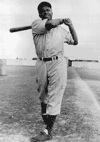
Robinson, Jackie
byname of Jack Roosevelt Robinson(born January 31, 1919, Cairo, Georgia, U.S.—died October 24, 1972, Stamford, Connecticut) the first black baseball player to play in the American major leagues during the 20th century. On April 15, 1947, Robinson broke the decades-old colour bar of Major League Baseball when he appeared on the field for the National League Brooklyn Dodgers. He played as an infielder and outfielder for the Dodgers from 1947 through 1956.
Reared in Pasadena, California, Robinson became an outstanding all-around athlete at Pasadena Junior College and the University of California, Los Angeles (UCLA). He excelled in football, basketball, and track as well as baseball. Robinson withdrew from UCLA in his third year to help his mother care for the family. In 1942 he entered the U.S. Army and attended officer candidate school; he was commissioned a second lieutenant in 1943. Robinson faced court-martial in 1944 for refusing to follow an order that he sit at the back of a military bus. The charges against Robinson were dismissed, and he received an honourable discharge from the military. The incident, however, presaged Robinson's future activism and commitment to civil rights. Upon leaving the army, he played professional football in Hawaii and baseball with the Kansas City Monarchs of the Negro American League, where he drew the attention of the president and general manager of the Brooklyn Dodgers, Branch Rickey.
Rickey had been planning an attempt to integrate baseball and was looking for the right candidate. Robinson's skills on the field, his integrity, and his conservative family-oriented lifestyle all appealed greatly to Rickey. Rickey's main fear concerning Robinson was that he would be unable to withstand the racist abuse without responding in a way that would hurt integration's chances for success. During a legendary meeting Rickey shouted insults at Robinson, trying to be certain that Robinson could accept taunts without incident. On October 23, 1945, Rickey signed Robinson to play on a Dodger farm team, the Montreal Royals of the International League.
Robinson led that league in batting average in 1946 and was brought up to play for Brooklyn in 1947. He was an immediate success on the field. Leading the National League in stolen bases, he was chosen Rookie of the Year. In 1949 he won the batting championship with a .342 average and was voted the league's Most Valuable Player (MVP).
His personal experiences were quite different. Fans hurled bottles and invectives at him. Some Dodger teammates openly protested against having to play with an African American, while players on opposing teams deliberately pitched balls at Robinson's head and spiked him with their shoes in deliberately rough slides into bases. Not everyone in baseball was unsupportive of Robinson. When players on the St. Louis Cardinals team threatened to strike if Robinson took the field, commissioner Ford Frick quashed the strike, countering that any player who did so would be suspended from baseball. Dodger captain Pee Wee Reese left his position on the field and put an arm around Robinson in a show of solidarity when fan heckling became intolerable, and the two men became lifelong friends. However, with the ugly remarks, death threats, and Jim Crow laws that forbade a black player to stay in hotels or eat in restaurants with the rest of his team, Robinson's groundbreaking experience in the major leagues was bleak. Of this period Robinson later stated,
Plenty of times I wanted to haul off when somebody insulted me for the color of my skin, but I had to hold to myself. I knew I was kind of an experiment. The whole thing was bigger than me.
His career in baseball was stellar. His lifetime batting average was .311, and he led the Dodgers to six league championships and one World Series victory. As a base runner, Robinson unnerved opposing pitchers and terrorized infielders who had to try to prevent him from stealing bases.
After retiring from baseball early in 1957, Robinson engaged in business and in civil rights activism. He was a spokesperson for the National Association for the Advancement of Colored People (NAACP) and made appearances with Martin Luther King, Jr. With his induction in 1962, Robinson became the first black person in the Baseball Hall of Fame, in Cooperstown, New York. His autobiography, I Never Had It Made, was published in 1972. In 1982 U.S. President Ronald Reagan awarded Robinson the Congressional Medal of Freedom, the highest honour for an American civilian.
In April 1997, on the 50th anniversary of the breaking of the colour bar in baseball, baseball commissioner Bud Selig retired Robinson's jersey number, 42, from Major League Baseball. It was common for a team to retire the number of a player from that team, but for a number to be retired for all the professional teams within a sport was unprecedented. (Those players with that number then playing on any team would be allowed to finish their careers without changing numbers, but after that time the number would never be used again.)
Copyright © 1994-2005 Encyclopædia Britannica, Inc.


